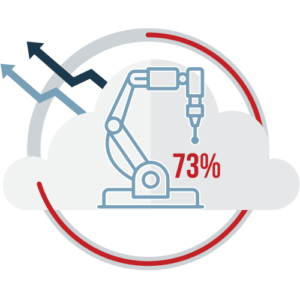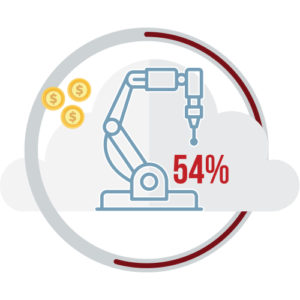

As manufacturers face increasing pressure to optimize their operations, even the most reluctant organizations are left with little choice but to embrace digital transformation. One of the options open to manufacturers looking to modernize their IT setup is cloud computing. But what is the cloud exactly, and what benefits does it offer manufacturers?
The cloud for manufacturers explained
Traditionally, even manufacturing companies that weren’t particularly IT-savvy had to manage their IT infrastructure locally. The rise of cloud computing software at the turn of the century changed all this.
The cloud refers to a network of servers used for data storage, management and processing. These networks — accessible via internet — can be hosted in-house for use by one company (private cloud) or by a third party that provides services for several companies (public cloud).
This means that organizations can outsource just about every aspect of their IT setup to cloud computing companies, from renting servers and virtual machines in datacenters to having software vendors take care of all hosting, maintenance and update tasks.
The convenience alone sounds enticing enough, but this is far from the only benefit the cloud has to offer.
#1: The cloud makes manufacturers agile
Technology continues to advance at an unrelenting pace, opening exciting new avenues for manufacturers along the way. But capitalizing on these opportunities is easier said than done for manufacturing companies struggling with an outdated IT infrastructure.
This is one of the many areas where cloud computing companies can help manufacturers thrive.
According to Forbes, cloud-based systems are faster to roll out than traditional systems, making it easier for manufacturers to keep up with new developments. They are also easier to customize and scale, and they offer the potential to increase adoption rates across resellers.
It’s hardly surprising then that 73% of manufacturing companies find it either important or very important that cloud-based supply chain solutions are able to scale and establish collaboration in order to reduce risk and increase agility.

#2: The cloud grants manufacturers access to more powerful resources
Thanks to the cloud, manufacturers no longer need to limit themselves to the tech they can host and manage in-house. Today, there’s a cloud-based solution for just about any type of IT challenges:
- Infrastructure as a Service (IaaS) grants users access to virtual computing resources such as servers and storage.
- Platform as a Service (PaaS) delivers resources typically needed for software development, such as hardware and applications.
- Software as a Service (SaaS) provides access to software that is hosted, managed, and maintained by the third-party cloud specialist.
Thanks to cloud computing, everything from software to raw processing power can be rolled out with unprecedented speed. Basically, the cloud democratizes advanced IT hardware and software, bringing it within reach for manufacturers and other organizations that simply wouldn’t have access otherwise.
However, cloud-based solutions have many unique benefits for all organizations, even those with almost unlimited resources.
Take security, for example. According to The Cloud for Manufacturing report by Microsoft and Invensys, manufacturers that use cloud-based systems do not need to grant suppliers direct access to their internal network. By moving the security context toward a controlled external security perimeter, you can safeguard your internal systems while simultaneously improving your collaboration with suppliers.
Which brings us to our third benefit.
#3: The cloud saves manufacturers money
Setting up and maintaining an excellent IT infrastructure requires a lot of resources, from powerful servers and numerous licenses to skilled staff to keep everything running smoothly — and those certainly aren’t cheap. Luckily, the cloud makes them more affordable.
Research conducted by IDC indicates that mature cloud adopters achieve millions of dollars in benefits.
Surveyed organizations realized an average of $3 million in additional revenue per cloud-based application. This can be attributed to the ability to acquire new customers, improved time to market, and risk mitigation, for instance.
These companies also achieved another $1 million in cost reductions thanks to cloud computing benefits like improved IT organizational agility, business process improvements and risk mitigation. In fact, according to The Cloud for Manufacturing, cloud-based manufacturing solutions can reduce up to 54% of the costs relating to IT infrastructure, maintenance and lifecycle for both new and existing operational or process improvement projects.

#4: The benefits of a cloud-based ERP system
It’s clear: cloud computing is the way forward for manufacturers. So why not utilize this revolutionary technology for your most important system: your ERP.
Microsoft recently launched their own cloud-based ERPs: Microsoft Dynamics 365 for Supply Chain Management and Microsoft Dynamics 365 for Financials. These solutions offer all the benefits that you’ve come to expect from Microsoft’s ERP suite, combined with the power of Microsoft Azure — their cloud computing platform and services.
Benefits of Microsoft Dynamics 365 include:
- Quick access to data from any location
- Ability to manage financials, field services, sales, operations and more in one platform
- Use of the global network of Microsoft-managed datacenters
- Easy management of the many steps and unique mechanisms needed to capture volumes of data
- And, last but not least, access to powerful integrated solutions via the Azure Marketplace, such as the Sana Commerce e-commerce platform, available for both Financials and Supply Chain Management.
As manufacturers face increasing pressure to optimize their operations, even the most reluctant organizations are left with little choice but to embrace digital transformation. One of the options open to manufacturers looking to modernize their IT setup is cloud computing. But what is the cloud exactly, and what benefits does it offer manufacturers?
The cloud for manufacturers explained
Traditionally, even manufacturing companies that weren’t particularly IT-savvy had to manage their IT infrastructure locally. The rise of cloud computing software at the turn of the century changed all this.
The cloud refers to a network of servers used for data storage, management and processing. These networks — accessible via internet — can be hosted in-house for use by one company (private cloud) or by a third party that provides services for several companies (public cloud).
This means that organizations can outsource just about every aspect of their IT setup to cloud computing companies, from renting servers and virtual machines in datacenters to having software vendors take care of all hosting, maintenance and update tasks.
The convenience alone sounds enticing enough, but this is far from the only benefit the cloud has to offer.
#1: The cloud makes manufacturers agile
Technology continues to advance at an unrelenting pace, opening exciting new avenues for manufacturers along the way. But capitalizing on these opportunities is easier said than done for manufacturing companies struggling with an outdated IT infrastructure.
This is one of the many areas where cloud computing companies can help manufacturers thrive.
According to Forbes, cloud-based systems are faster to roll out than traditional systems, making it easier for manufacturers to keep up with new developments. They are also easier to customize and scale, and they offer the potential to increase adoption rates across resellers.
It’s hardly surprising then that 73% of manufacturing companies find it either important or very important that cloud-based supply chain solutions are able to scale and establish collaboration in order to reduce risk and increase agility.

#2: The cloud grants manufacturers access to more powerful resources
Thanks to the cloud, manufacturers no longer need to limit themselves to the tech they can host and manage in-house. Today, there’s a cloud-based solution for just about any type of IT challenges:
- Infrastructure as a Service (IaaS) grants users access to virtual computing resources such as servers and storage.
- Platform as a Service (PaaS) delivers resources typically needed for software development, such as hardware and applications.
- Software as a Service (SaaS) provides access to software that is hosted, managed, and maintained by the third-party cloud specialist.
Thanks to cloud computing, everything from software to raw processing power can be rolled out with unprecedented speed. Basically, the cloud democratizes advanced IT hardware and software, bringing it within reach for manufacturers and other organizations that simply wouldn’t have access otherwise.
However, cloud-based solutions have many unique benefits for all organizations, even those with almost unlimited resources.
Take security, for example. According to The Cloud for Manufacturing report by Microsoft and Invensys, manufacturers that use cloud-based systems do not need to grant suppliers direct access to their internal network. By moving the security context toward a controlled external security perimeter, you can safeguard your internal systems while simultaneously improving your collaboration with suppliers.
Which brings us to our third benefit.
#3: The cloud saves manufacturers money
Setting up and maintaining an excellent IT infrastructure requires a lot of resources, from powerful servers and numerous licenses to skilled staff to keep everything running smoothly — and those certainly aren’t cheap. Luckily, the cloud makes them more affordable.
Research conducted by IDC indicates that mature cloud adopters achieve millions of dollars in benefits.
Surveyed organizations realized an average of $3 million in additional revenue per cloud-based application. This can be attributed to the ability to acquire new customers, improved time to market, and risk mitigation, for instance.
These companies also achieved another $1 million in cost reductions thanks to cloud computing benefits like improved IT organizational agility, business process improvements and risk mitigation. In fact, according to The Cloud for Manufacturing, cloud-based manufacturing solutions can reduce up to 54% of the costs relating to IT infrastructure, maintenance and lifecycle for both new and existing operational or process improvement projects.

#4: The benefits of a cloud-based ERP system
It’s clear: cloud computing is the way forward for manufacturers. So why not utilize this revolutionary technology for your most important system: your ERP.
Microsoft recently launched their own cloud-based ERPs: Microsoft Dynamics 365 for Supply Chain Management and Microsoft Dynamics 365 for Financials. These solutions offer all the benefits that you’ve come to expect from Microsoft’s ERP suite, combined with the power of Microsoft Azure — their cloud computing platform and services.
Benefits of Microsoft Dynamics 365 include:
- Quick access to data from any location
- Ability to manage financials, field services, sales, operations and more in one platform
- Use of the global network of Microsoft-managed datacenters
- Easy management of the many steps and unique mechanisms needed to capture volumes of data
- And, last but not least, access to powerful integrated solutions via the Azure Marketplace, such as the Sana Commerce e-commerce platform, available for both Financials and Supply Chain Management.

Digital transformation challenges for manufacturing
Discover the trends that will dominate the manufacturing industry



